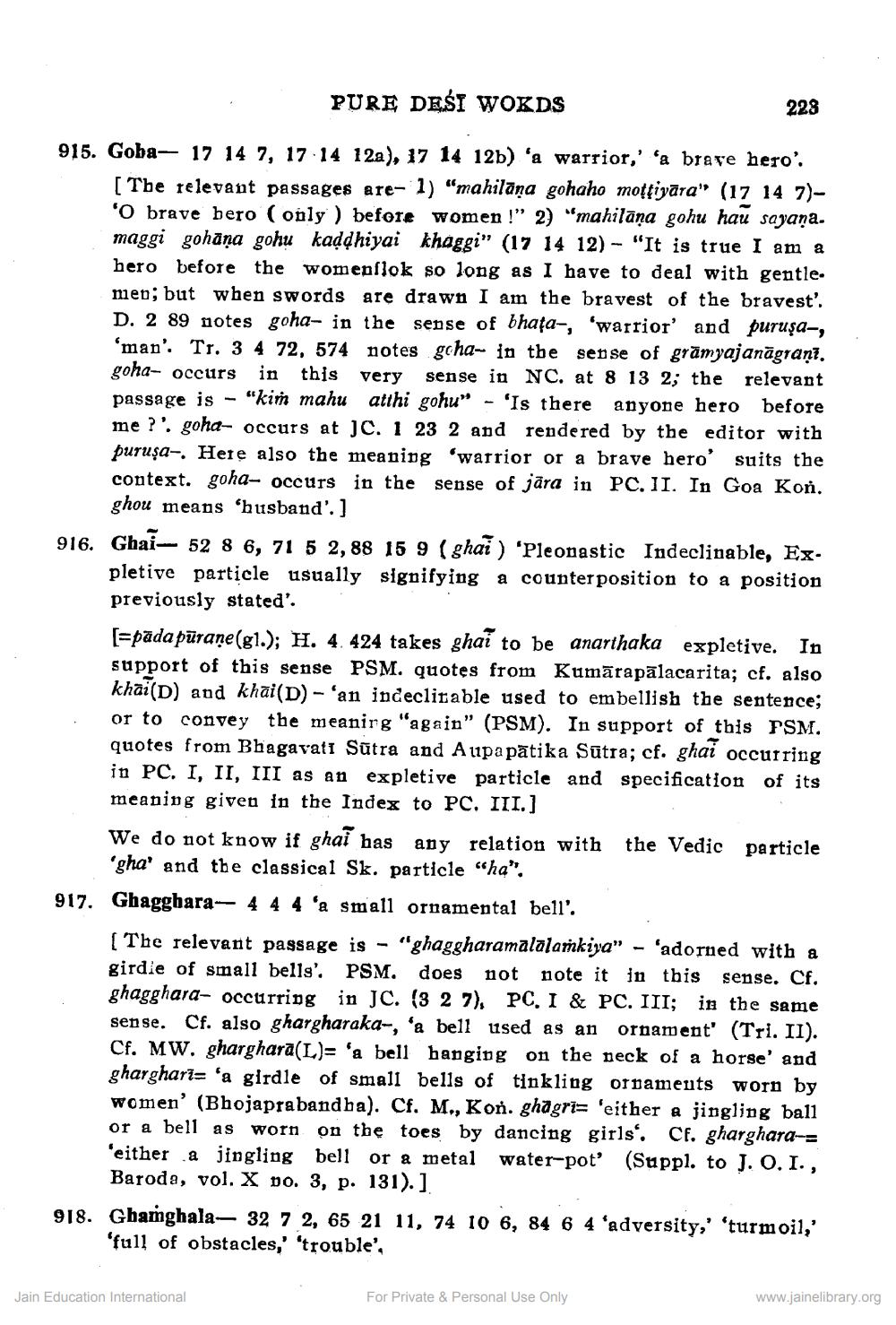________________
PURE DESI WOKDS
228
915. Goba- 17 14 7, 17.14 12a), 17 14 12b) 'a warrior,' 'a brave hero'.
[The relevant passages are- 1) "mahilāna gohaho mottiyāra" (17 14 7)'Obrave hero ( only ) before women !” 2) "mahilāņa gohu hau sayaņa. maggi gohana gohu kaddhiyai khággi" (17 14 12) - "It is true I am a hero before the womepflok so long as I have to deal with gentle. men; but when swords are drawn I am the bravest of the bravest'. D. 2 89 notes goha- in the sense of bhafa-, 'warrior' and puruşa-, 'man'. Tr. 3 4 72, 574 notes geha- in the sense of grāmyajanāgrani. goha- occurs in this very sense in NC. at 8 13 2; the relevant passage is - "kim mahu atthi gohu" - 'Is there anyone hero before
e ?'. goha- occurs at JC. 1 23 2 and rendered by the editor with puruşa-. Here also the meaning 'warrior or a brave hero' suits the context. goha- occurs in the sense of jāra in PC. II. In Goa Kon. ghou means 'husband'. ]
916. Ghai-52 8 6, 71 5 2,88 15 9 ( ghai ) 'Pleonastic Indeclinable, Ex.
pletive particle usually signifying a counter position to a position previously stated'. (=pada pūraņe(g1.); H. 4. 424 takes ghai to be anarthaka expletive. In support of this sense PSM. quotes from Kumārapālacarita; cf. also khai(D) and khai(D) - 'an indeclitable used to embellish the sentence; or to convey the meaning "again" (PSM). In support of this PSM. quotes from Bhagavati Sūtra and Aupa pātika Sūtra; cf. ghai occurring in PC. I, II, III as an expletive particle and specification of its meaning given in the Index to PC. III.] We do not know if ghai bas any relation with the Vedic particle
'gha' and the classical Sk. particle "ha". 917. Ghaggbara- 4 4 4 'a small ornamental bell'.
The relevant passage is - "ghaggharamalalarkiya" - 'adorned with a girdle of small bells'. PSM, does not note it in this sense. Cf. ghagghara- occurring in JC. (3 2 7), PC. I & PC. III; in the same sense. Cf. also ghargharaka-, 'a bell used as an ornament' (Tri. II). Cf. MW. gharghara(L)= 'a bell hanging on the neck of a horse' and gharghari= 'a girdle of small bells of tinkling ornaments worn by women' (Bhojaprabandha). Cf. M., Kon. ghagri= 'either a jingling ball or a bell as worn on the toes by dancing girls'. Cf. gharghara-= 'either a jingling bell or a metal water-pot (Suppl. to J. O, I.,
Baroda, vol. X do. 3, p. 131). ] 918. Ghamghala— 32 7 2, 65 21 11, 74 10 6, 84 6 4 'adversity,' 'turmoil,'
'full of obstacles,' 'trouble',
Jain Education International
For Private & Personal Use Only
www.jainelibrary.org




